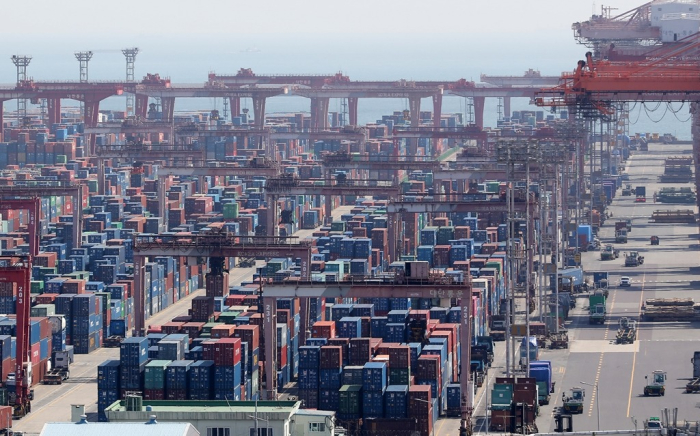Economy
S.Korea’s current account surplus near 3-year high on chips
Overseas direct investments rose in February, especially in the electric vehicle battery sector; portfolio investments were also up
By Apr 05, 2024 (Gmt+09:00)
1
Min read
Most Read
LG Chem to sell water filter business to Glenwood PE for $692 million


KT&G eyes overseas M&A after rejecting activist fund's offer


Kyobo Life poised to buy Japan’s SBI Group-owned savings bank


StockX in merger talks with Naver’s online reseller Kream


Meritz backs half of ex-manager’s $210 mn hedge fund



South Korea’s current account surplus touched a near three-year high in February as goods exports continued to grow on strong overseas sales of semiconductors, the country’s top export item, while imports declined, central bank data showed on Friday.
The country logged a current account surplus of $7.7 billion on a seasonally adjusted basis in February, the largest since June 2021, the Bank of Korea said.
Goods exports of Asia’s fourth-largest economy grew 8.9% to a seasonally adjusted $57.7 billion from a year earlier, the largest since October 2023. Semiconductor exports in February surged 63% on-year to $10 billion. The country is home to the world’s two largest memory chipmakers – Samsung Electronics Co. and SK Hynix Inc.
“Semiconductors’ export growth accelerated, although exports of steel products and passenger cars turned lower,” the central bank said in a statement.
On the other hand, goods imports fell 8.2% to a seasonally adjusted $49.5 billion on lower energy prices, resulting in a goods account surplus of $8.2 billion.
WIDER SERVICES ACCOUNT DEFICIT
The services account logged a deficit of $2.2 billion on a seasonally adjusted basis in February, the largest since last November, as the travel account shortfall widened to a seasonally adjusted $1.5 billion from $1 billion in the previous month.
The primary income account, which tracks the wages of foreign workers, dividend payments from overseas and interest income, turned to a surplus of $2.2 billion from a deficit of $816.8 million thanks to higher returns from overseas investments.
In the financial account, South Koreans' overseas direct investments increased by $3.3 billion in February, especially in the secondary battery sector, larger than the previous month’s $2.2 billion, but foreigners’ investments in the country declined by $710 million.
South Koreans' portfolio investments in other countries rose by $9.1 billion in February, while foreigners’ portfolio investments in local markets jumped by $10.7 billion as they ramped up stock investments by $5.6 billion.
Write to Jin-gyu Kang at josep@hankyung.com
Jongwoo Cheon edited this article.
More to Read
-
 Korean stock marketForeign buying of Korean stocks hit record high in Q1
Korean stock marketForeign buying of Korean stocks hit record high in Q1Mar 31, 2024 (Gmt+09:00)
3 Min read -
 EconomyKorea’s factory output rebounds in February on chip recovery
EconomyKorea’s factory output rebounds in February on chip recoveryMar 29, 2024 (Gmt+09:00)
2 Min read -
 EconomyS.Korea’s 2024 exports get off to strong start on China, semiconductors
EconomyS.Korea’s 2024 exports get off to strong start on China, semiconductorsFeb 01, 2024 (Gmt+09:00)
3 Min read
Comment 0
LOG IN


